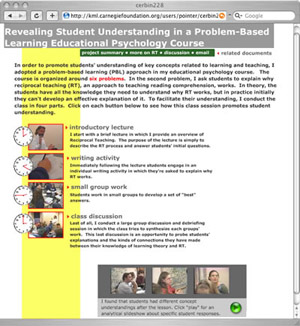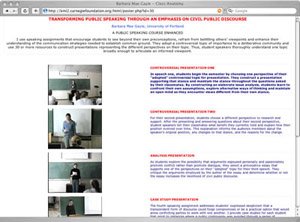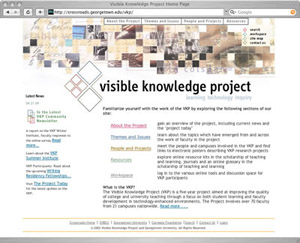 Exhibitions
Exhibitions  Building Knowledge
Building Knowledge | Building Knowledge for Teaching and Learning |
The Promise of Scholarship in a Networked Environment
The works displayed in this exhibition complement the article,
BUILDING KNOWLEDGE FOR TEACHING AND LEARNING: THE PROMISE OF SCHOLARSHIP
IN A NETWORKED ENVIRONMENT. Written by Thomas
Hatch, Randy Bass, Toru Iiyoshi, and Desiree Pointer Mace,
the article appears in the September/October 2004 issue of Change
Magazine. These sites produced by the Carnegie Scholars and
the members of the Knowledge Media Lab (KML), as well as those
created by the faculty affiliated with the Visible Knowledge
Project (VKP), represent initial attempts to create distinct
forms—such
as the course portfolio—that
others can use to produce multimedia representations reflecting
the crucial dimensions of pedagogical expertise.
At the Carnegie Knowledge Media Lab and the Visible Knowledge Project at Georgetown University, we are working collaboratively with faculty to create new methods and forms for documenting and exchanging the intellectual work of teaching. This work builds on and complements a variety of early efforts to place course materials and the scholarship of teaching online as well as more recent initiatives to create virtual environments that join together faculty across campuses and disciplines. These efforts show the promise of technology, but they also make clear that advances in technology will mean little if we do not confront three key obstacles that traditionally impede initiatives to improve teaching and learning in higher education:
The invisibility and inaccessibility of teaching expertise, assumptions of individual responsibility for teaching and learning, and narrow and simple treatments of teaching provide few incentives for using new technologies to foster the intellectual activities or develop the kind of collective knowledge that can advance the field. Several key steps need to be taken in order to take advantage of technology to establish a new medium for the production, critique, and exchange of faculty knowledge. First, we need to develop new genres for the representation and exchange of the knowledge of teaching and learning; second, we need to create the technological tools and resources needed to produce those representations; and third, we need to establish the electronic platforms and the virtual communities that can support collaborative reflection and the efforts of faculty to take an inquiry stance towards their teaching. Ultimately, these efforts to use technology to make teaching public on a wide basis and to foster collaborative reflection can contribute to the development of a much more sophisticated understanding of teaching and learning and the development of the means to put that understanding into practice. Web-based tools used by Carnegie Scholars and VKP faculty help to simplify the technical tasks and facilitate the intellectual work involved in using technology to make their teaching public. Such tools are designed to enable faculty from many different disciplines and with varying levels of technical expertise to: 1) identify and select materials that reflect all dimensions of their teaching; 2) organize their materials and reflections into meaningful and manageable representations; and 3) prompt further analysis and reflection.
Related Links
|
|||||||||||||



